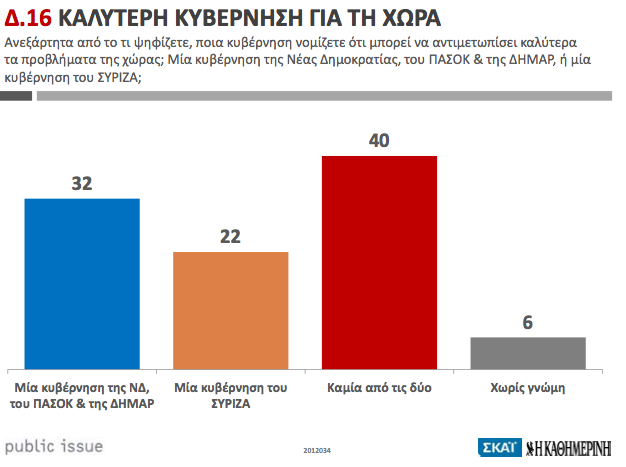Title photo: Vassilis Vafidis
Eight out of ten Greeks believe that Greece is moving in the wrong direction, according to the poll of Public Issue for October 2012 commissioned by Skai TV and Kathimerini newspaper. About half of the participants in the poll believe that the Greek administration has been operating worse after a series of 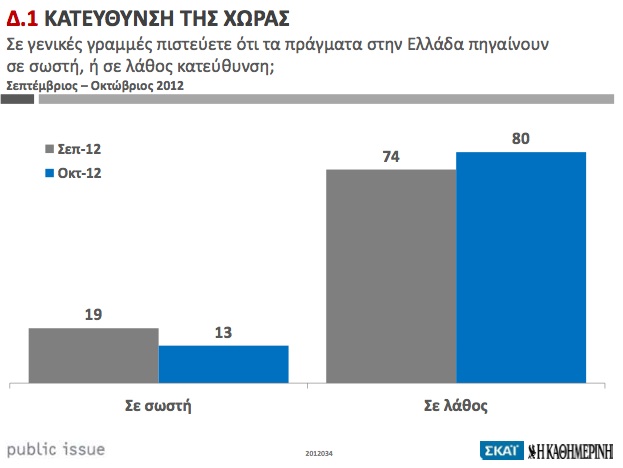 reforms and only 16% believe that the functioning of the state system has improved.
reforms and only 16% believe that the functioning of the state system has improved.
Over 80% of respondents state with confidence that the new fiscal adjustment measures will be voted on in parliament. Dissatisfaction with the new cuts is growing as well as the feeling of anxiety and frustration, Greek analysts comment. The general dissatisfaction with the conditions coming with the financial aid has increased significantly compared to the summer of 2012.
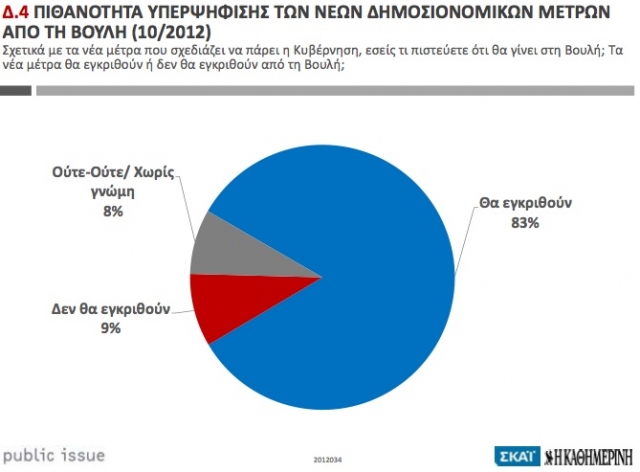
Seven in ten oppose the Memorandum of financial support. Only 19% say they are "for" the agreement through which Greece is obtaining money from Europe and the International Monetary Fund as against the 29% during the second election in June. Analysts attribute this difference to the uncertainty that had gripped the society during the election campaign in the middle of the year. It was thought then that there was an increased risk for Greece to financially collapse and stronger political instability was felt.
The changes imposed by the fiscal adjustment affect the living standards of citizens as well. When asked about the change in the standard of living, 72% respond that it is difficult for them to cope with the decrease in revenue, the increase of basic costs and with the tax burden. Another 28% say they manage to cope and only 3% of them state that they live comfortably without deprivation.
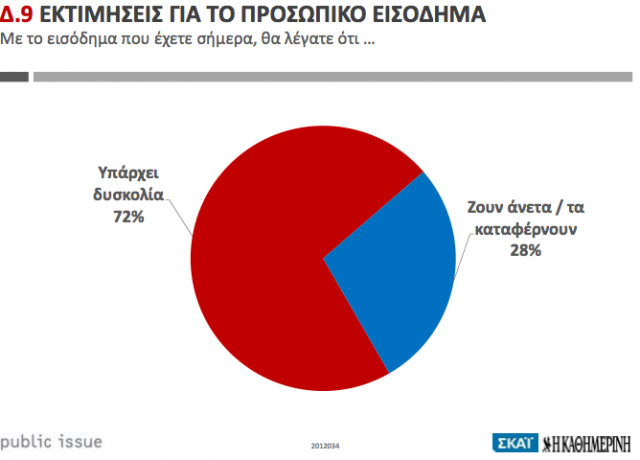
 In political life, the most unpopular politician turns out to be PASOK leader, and a member of the tripartite coalition, Evangelos Venizelos. His rating collapsed by 9% between September and October and reached 20% from 29%. Damaged, but to a lesser extent, is the image of the leader of Democratic Left, Fotis Kouvelis, who also supports the government coalition. His popularity dropped to 48% in October from 52% in September. However, he remains the most popular among Greek politicians and he has the highest support among them too. Public opinion of Prime Minister Antonis Samaras remains unchanged. His level of popularity among the citizens remains the same both for September and October - 39%, which is two points lower than that of the leader of the parliamentary opposition SYRIZA. There is a slight decline in Alexis Tsipras’ popularity - one point, which is not considered significant, and it reached 41%.
In political life, the most unpopular politician turns out to be PASOK leader, and a member of the tripartite coalition, Evangelos Venizelos. His rating collapsed by 9% between September and October and reached 20% from 29%. Damaged, but to a lesser extent, is the image of the leader of Democratic Left, Fotis Kouvelis, who also supports the government coalition. His popularity dropped to 48% in October from 52% in September. However, he remains the most popular among Greek politicians and he has the highest support among them too. Public opinion of Prime Minister Antonis Samaras remains unchanged. His level of popularity among the citizens remains the same both for September and October - 39%, which is two points lower than that of the leader of the parliamentary opposition SYRIZA. There is a slight decline in Alexis Tsipras’ popularity - one point, which is not considered significant, and it reached 41%.
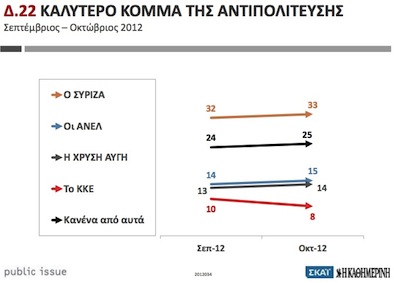 SYRIZA is considered to be the best opposition party. Between September and October, there was a slight increase in its popularity as a political opposition from 32 to 33 points. The next most popular opinion with 25 points is that none of the parties, which do not support the government, can be presented as an effective opposition force. Panos Kamenos’ Independent Greeks and Golden Dawn collect the same number of votes and according to Public Issue, the Communist Party of Greece KKE remains the weakest opposition party with 8% credibility in October compared to 10% in September.
SYRIZA is considered to be the best opposition party. Between September and October, there was a slight increase in its popularity as a political opposition from 32 to 33 points. The next most popular opinion with 25 points is that none of the parties, which do not support the government, can be presented as an effective opposition force. Panos Kamenos’ Independent Greeks and Golden Dawn collect the same number of votes and according to Public Issue, the Communist Party of Greece KKE remains the weakest opposition party with 8% credibility in October compared to 10% in September.
The responses to the question "Who would you prefer to govern the country – the tripartite coalition government (New Democracy, PASOK, Democratic Left) or the government of SYRIZA?" provide evidence of the disappointment in Greek political life. The most common response of 40% of the respondents is "neither of the presented options." Another 32% support the coalition government, whereas 22% support the government of SYRIZA.
